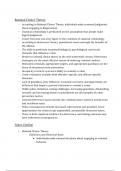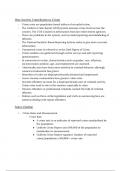Christydesormice
On this page, you find all documents, package deals, and flashcards offered by seller christydesormice.
- 5
- 0
- 0
Community
- Followers
- Following
5 items

Chemistry Major topics
Chemical reactions involve the transformation of substances into new substances through the breaking and forming of chemical bonds. These reactions are governed by fundamental chemical principles and are categorized into different types based on the nature of the changes that occur.
- Summary
- • 8 pages •
Chemical reactions involve the transformation of substances into new substances through the breaking and forming of chemical bonds. These reactions are governed by fundamental chemical principles and are categorized into different types based on the nature of the changes that occur.

Rational choice theory
Rational choice theory is a perspective in criminology and economics that assumes individuals are rational actors who make decisions based on a cost-benefit analysis aimed at maximizing their self-interest. This theory suggests that individuals weigh the potential benefits and costs of various courses of action before choosing to engage in a particular behavior, including criminal activities. Rational choice theory is a key component of classical criminology and has influenced various fields, in...
- Class notes
- • 4 pages •
Rational choice theory is a perspective in criminology and economics that assumes individuals are rational actors who make decisions based on a cost-benefit analysis aimed at maximizing their self-interest. This theory suggests that individuals weigh the potential benefits and costs of various courses of action before choosing to engage in a particular behavior, including criminal activities. Rational choice theory is a key component of classical criminology and has influenced various fields, in...

Victimology
Victimology is the scientific study of victims and victimization, focusing on understanding the experiences, consequences, and responses associated with being a victim of crime. This field of study emerged to shift the focus from traditional criminology, which primarily concentrated on understanding the offenders, to examining the impact of criminal behavior on those who are victimized.
- Class notes
- • 5 pages •
Victimology is the scientific study of victims and victimization, focusing on understanding the experiences, consequences, and responses associated with being a victim of crime. This field of study emerged to shift the focus from traditional criminology, which primarily concentrated on understanding the offenders, to examining the impact of criminal behavior on those who are victimized.

How Society Contributes to Crime
Society plays a significant role in contributing to crime through a variety of interconnected factors. It's important to note that crime is a complex and multifaceted phenomenon, and there is no single cause. Instead, criminal behavior is often the result of a combination of individual, social, economic, and environmental factors.
- Class notes
- • 4 pages •
Society plays a significant role in contributing to crime through a variety of interconnected factors. It's important to note that crime is a complex and multifaceted phenomenon, and there is no single cause. Instead, criminal behavior is often the result of a combination of individual, social, economic, and environmental factors.

Introduction to Criminology
Criminology is the scientific study of crime, criminal behavior, and the social and institutional responses to crime. It is a multidisciplinary field that draws on insights from sociology, psychology, law, anthropology, and other disciplines to understand the causes, patterns, and consequences of criminal behavior. The primary goal of criminology is to gain knowledge about crime and the criminal justice system to develop effective strategies for crime prevention, control, and rehabilitation.
- Class notes
- • 4 pages •
Criminology is the scientific study of crime, criminal behavior, and the social and institutional responses to crime. It is a multidisciplinary field that draws on insights from sociology, psychology, law, anthropology, and other disciplines to understand the causes, patterns, and consequences of criminal behavior. The primary goal of criminology is to gain knowledge about crime and the criminal justice system to develop effective strategies for crime prevention, control, and rehabilitation.
